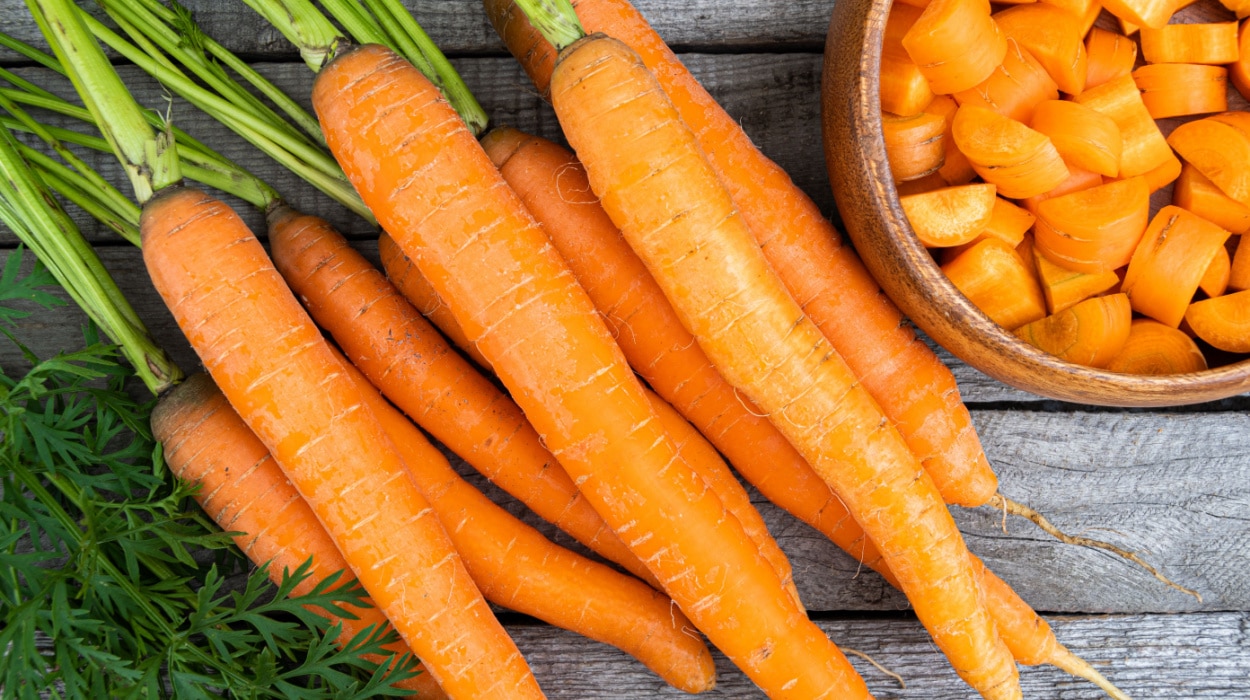Carrots are root vegetables, grown in the ground similar to potatoes. Because of the health benefits of carrots, they should be a staple of everyone’s diet. They are native to Europe and Southwest Asia but are grown all over the world.
Carrots are known for their orange color, though carrots also come in purple, red, yellow, and white colors. Orange carrots get their color from beta-carotene, which is converted into vitamin A after digestion. Carrots are rich in other vitamins and minerals, as well as fiber, carbs, and water (they are over 80% water), and can be prepared in a variety of ways to enjoy with any meal.
Top 8 Amazing Health Benefits Of Carrots 2024
- Help with weight loss
- Lower cholesterol
- Improve eye health
- Boost immunity
- Reduce the risk of cancer
- Great for gut health
- Balance blood sugar
- Regulate blood pressure
8 Benefits Of Carrots In 2024: What Are They?
Help With Weight Loss
Including foods with fiber (soluble and insoluble) in your healthy diet is a non-negotiable for weight loss. Fiber promotes a feeling of fullness, which prevents snacking and overeating. Additionally, fiber promotes overall health, better sleep, hormone balance, and energy, all of which are needed to create a fertile ground for the body to lose weight healthfully.
Lower Cholesterol
Fiber to the rescue again! The high amount of fiber in carrots makes them instrumental in maintaining healthy cholesterol. Fiber helps to remove excess cholesterol which can be stuck in blood vessels and arteries. Carrots also contain a type of calcium that the body may use to be able to help lower LDL (“bad”) cholesterol.
Improve Eye Health
Great eye health[1] can be supported by eating carrots. A lot has to do with the high amounts of vitamin A, an antioxidant and vitamin that protects cells, including eye cells. Vitamin A deficiency, by contrast, can lead to vision problems. The lutein and zeaxanthin in carrots are also said to provide protection for the retina and eye lenses.
Boost Immunity
Carrots are rich in both vitamin C and A, both powerhouses for immunity. Vitamin C is often sold in supplement form specifically to boost immunity, but vitamin A’s role is less well-known. Vitamin A helps to create and protect our mucous membranes which live in our gastrointestinal and respiratory linings, and whose job is to keep germs away. The membranes serve as barriers to the germs and these barriers are reinforced with the help of vitamin A.
Reduce The Risk Of Cancer
Antioxidants are key players when it comes to reducing disease risk, including cancer prevention. And guess which food has lots of antioxidants? Yep, carrots. Carrots can help reduce the risk of certain cancers[2] such as lung, colorectal, prostate, and leukemia. Carrots’ composition of beta carotene and carotenoid makes them exceptionally beneficial in helping to prevent the disease. The lycopene in carrots may also serve to fight cancer cells in cancers of the stomach, lungs, prostate, and breast.
Great For Gut Health
A superstar of gut health is fiber; it’s essential for a healthy digestive system. In fact, those who consume less fiber are at higher risk for colorectal cancer. Carrots are an excellent source of fiber, which helps to promote digestive regularity and feed the beneficial bacteria that make up the gut microbiome. Much of our immune cells live in the gut, and the vitamins A and C in carrots help to boost those cells as well.
Balance Blood Sugar
Even though carrots are high in sugar, they are considered a non-starchy vegetable, which means they have less of an impact on blood sugar than starchier foods (think potatoes). Additionally, fiber is crucial for managing blood sugar, and carrots have lots of it. Vitamin A and beta carotene have also been shown to help reduce the risk of developing diabetes. Studies also suggest that the carotenoids in carrots may be influential in managing diabetes.[3]
Regulate Blood Pressure
Carrots, like bananas, are high in potassium – a key mineral in blood pressure regulation. It does this by balancing our sodium (salt) levels and helps to remove excess amounts from the body (this relieves the heart). This is also why carrots can help with salt-related bloating. Carrots are high on many cardiologists’ lists of heart-healthy foods[1] to keep blood pressure in good standing.
Carrot Nutrition

Carrots offer many nutrients, however, the amounts may vary depending on the size of the carrot and whether it’s cooked or raw. Two medium carrots (which are roughly 100 grams of carrots) contain 88% water.[2] The following breakdown:
- 40 calories
- 1 gram of protein
- 10 grams of carbs
- 4.7 grams of sugar
- 2.8 grams of fiber
- Less than 1 gram of fat
Carrots also come with vitamins and minerals including
Vitamin A: Carrots are particularly rich in beta-carotene, which is converted to vitamin A in the body. It is important for vision, immune function, and skin health.
Vitamin C: This antioxidant vitamin is important for immune function, wound healing, and collagen production.
Vitamin K1: This vitamin is important for blood clotting and bone health.
Potassium: This mineral is important for maintaining fluid balance, regulating blood pressure, and supporting muscle and nerve function.
Fiber: Carrots are a good source of both soluble and insoluble fiber, which can help to support healthy digestion and promote feelings of fullness.
Other minerals: Carrots also contain small amounts of other important minerals such as calcium, iron, magnesium, and phosphorus.
This root veggie also contains many antioxidants,[2] which help to fight free radicals that can damage cells. These antioxidants include alpha-carotene, lutein, lycopene, and anthocyanins. Many whole foods with dark, rich colors (such as those found in orange, red, and purple carrots) are packed with these antioxidants.
Most vitamins and minerals are better absorbed when paired with fat, therefore, when eating carrots (or any vegetable), include a source of healthy fat such as grass-fed butter or ghee, olive oil, avocado, or a serving of nuts on the side.
How To Add Carrots To Your Diet?

Carrots can be eaten raw or cooked. If you prefer to eat raw carrots, they can be:
- Eaten as a snack (typically baby carrots) with hummus, bean dip, or enjoyed on their own.
- Shaved and shredded into tiny slivers then added to salads, mixed into dishes, or used as a garnish.
- Shredded and added to burritos, wraps, spring rolls, and sandwiches.
- Juiced to make fresh carrot juice or added to another vegetable juice.
If cooked carrots are your thing, they can be:
- Baked, sauteed, boiled, steamed, pureed, and even fried.
- Added to veggie bowls and salads.
- Baked into lasagnas, added to pasta primaveras, and cooked into curries.
- Cooked in soups and stews.
- Chopped finely and mixed into meatballs.
- Cooked in water with other vegetables to make broth, then strained out if desired (most of the nutrients will remain in the broth).
- Baked or boiled then mashed or pureed into baby food or carrot soup.
Are Carrots Beneficial For Everyone?
Raw carrot is generally good for most people, but you can have too much of a good thing: vitamin A. Sometimes when people eat too many carrots, their skin turns orange. This is a telltale sign that it’s time to pull back on carrot intake. However, there may be other signs of vitamin A toxicity] which include blurred vision, pain in the bones, nausea, and sensitivity to sunlight. If you experience these symptoms, have your doctor check your beta carotene and/or vitamin A (retinol) levels. This can be done via a blood draw or stool test. Because vitamin A is a fat-soluble vitamin, excess amounts can be stored either in the liver or fat tissue, and when those storage areas are at capacity, it can create toxicity in the body. Long-term toxicity can pose more serious health complications down the line.
Organic carrots are generally easy to digest, however, for those with sensitive gastrointestinal systems, it might be best to eat them cooked rather than raw.
However, as long as your vitamin A levels are normal and you feel good including carrots in your balanced diet, there’s no reason to avoid them.
Conclusion
Carrots are non-starchy root vegetables that are generally higher in sugar than most vegetables, but also high in fiber to balance it out. They are loaded with antioxidants, vitamins, and minerals, which together promote digestive health, eye health, regulate blood pressure and blood sugar, help protect against and fight off disease, and can aid in weight loss. A medium carrot can be prepared in any number of ways and is easy to make a regular staple in your healthy diet.
Frequently Asked Questions
Eating moderate amounts of carrots is unlikely to turn your skin orange. However, consuming excessive amounts of carotenoid-rich foods can cause a harmless condition called carotenemia, which may result in yellow or orange discoloration of the skin. The discoloration usually goes away when carotenoid intake is reduced.
Carrot juice is relatively healthy. Pure carrot juice has lots of vitamins and minerals, however, any time you juice a fruit or vegetable, you’re stripping out the fiber and leaving just the sugar (this is especially true for carrots which are high in sugar). If you’re going to drink carrot juice, it’s best to have it with a meal rather than on its own, so that the other macronutrients (protein, fat, carbs, fiber) will help slow down the sugar absorption in the body.
Both cooked and raw carrots provide a range of important nutrients, but the nutrient content can vary depending on the cooking method. Cooking can cause some loss of nutrients in carrots, particularly water-soluble vitamins such as vitamin C and B vitamins. However, cooking can also increase the availability of other nutrients by breaking down cell walls and making them easier to absorb. On the other hand, raw carrots are a good source of enzymes, vitamins, and minerals that can be lost during cooking. They also contain fiber, which can help to support healthy digestion.
 Expert's opinion
Expert's opinion
